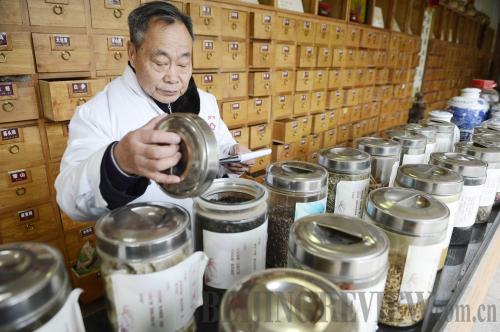|
 |
|
HANDING DOWN THROUGH AGES: A herborist at a drug store in Yinchuan, Ningxia Hui Autonomous Region, prepares herbal medicine for customers (XINHUA) |
Recently, Yunnan Baiyao, a hemostatic powdered medicine famous for stopping bleeding and relieving pain, was thrown in the spotlight as its manufacturer admitted the medicine contains aconitum, a toxic herbal ingredient that, if used improperly, could cause discomfort like numbness of the mouth and limbs, nausea, and even life-threatening conditions such as breathing difficulties and cardiac arrhythmia.
Yunnan Baiyao Group Co. Ltd. announced it has improved its product information disclosure as required and claimed its products are safe as its special processing technology has greatly reduced the toxicity of the aconitum. However, it still didn't disclose the full formula of Yunnan Baiyao on the grounds that it is classified as a national-level secret recipe.
In contrast, when the company broke into the U.S. market as a dietary supplement in 2002, it revealed the entire formula, as required by the U.S. Food and Drug Administration. The discrepancy led to a public debate on whether Chinese medicine, like Yunnan Baiyao, should be protected by a national-level secret recipe system. Supporters believe the protection is conducive to supporting the Chinese medicine industry in furthering innovation. Others argue that keeping the ingredients secret deprives consumers of their right to know what is in their medicine. The following are excerpts of opinions:
Supporters:
Yang Yue (Expert on traditional Chinese medicine): Although there are questions, the national-level secret recipe system is necessary in protecting intellectual property of traditional Chinese medicine (TCM). The protection should be intensified rather than weakened by disclosing the secret recipes. TCM is the pearl of Chinese people's wisdom and talents over the history of more than 5,000 years. The WTO permits countries to make individual policies to protect their traditional culture and knowledge. For example, India introduced a protection system on the intellectual property of its precious ancient books, requiring anyone who uses them to pay. However, China lacks such a protection, resulting in many precious multi-herbal formulas being lost and claimed by other countries. Therefore, the system can better protect our traditional medicine.
Wang Ying'an (Expert on traditional Chinese medicine): The research and development of Western medicine depends on advanced and sophisticated equipment and large capital investment. Even if the recipes were disclosed, it is not easy to be counterfeited. However, once formulas of Chinese medicine are open, everyone is able to produce it. If so, how can we protect the herbalists' legal rights and interests as well as their initiative to develop more eutherapeutic recipes?
The relationship between doctors and patients should be based on trust, not on trading drugs. In ancient China, patients turned to a doctor for help because they believed the doctor was able to cure them, not because the doctor was certified to practice.
However, nowadays, the medical system overemphasizes certification. And the fundamental standard to evaluate good doctors and medicine is ignored, leading to the market rife with fake doctors with certifications that are not helpful but only add an economic burden on patients.
At this critical time, should we choose medicine with a published formula and state certification, or give a shot on Chinese medicine of secret recipes that may rescue a life?
Of course, this type of Chinese medicine to save lives should be prescribed by doctors with authentic skills. Therefore, only when the medical circle gets rid of formalism with certifications as the only standard, and upholds curative effects as the principle to judge doctors and medicine, could patients find real benefits.
Xu Xinming (Lawyer on intellectual property rights): We should learn why there are national-level secret recipes before discussing whether the recipes should be publicized. Intellectual property rights include patents, trademarks, copyrights and commercial secrets. The protection of new drugs is mainly based on patent law. Western medicine is well protected under this system, while Chinese medicine isn't. Borrowed from Western countries, the [Chinese] patent law doesn't consider the characteristics of Chinese medicine to cover it under comprehensive protection.
The multi-herbal formulas of Chinese medicine are based on accumulation of experience. Different from the research and development of current drugs, there are few technological elements in Chinese medicine. Therefore, it cannot be well protected by patent law. Protecting the recipes is especially important to the development of the Chinese medicine industry. At the current stage, we shouldn't abandon the traditional way of protection and adopt the international standard immediately, as the move will be a fatal strike to the industry of Chinese medicine.
| 